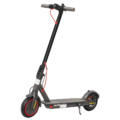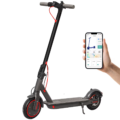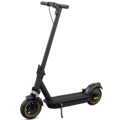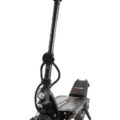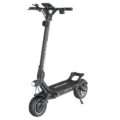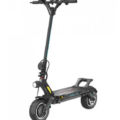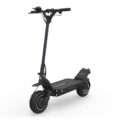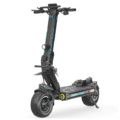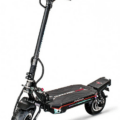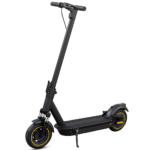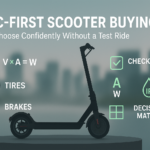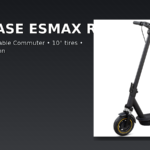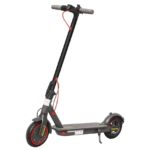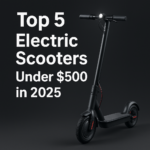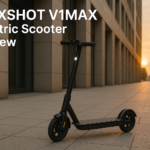- Home
- Scooters
- Electric Scooters
- JUICEASE 365Go
JUICEASE 365Go
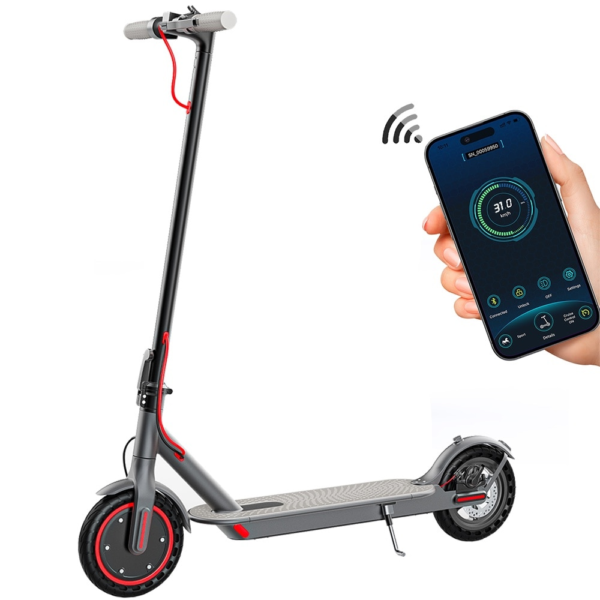

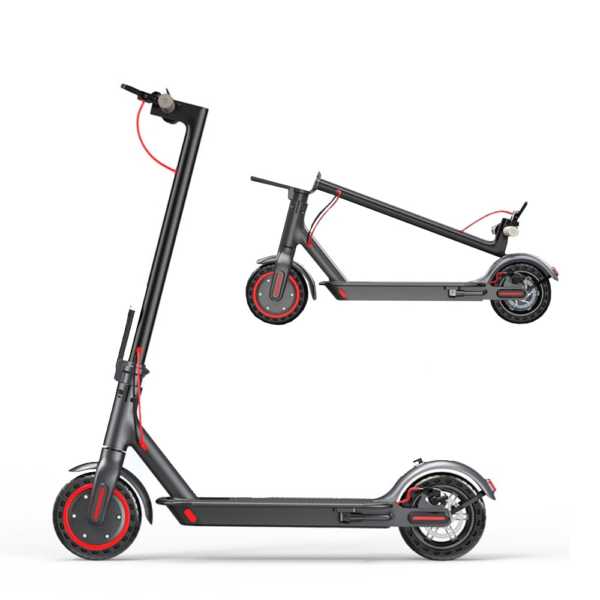
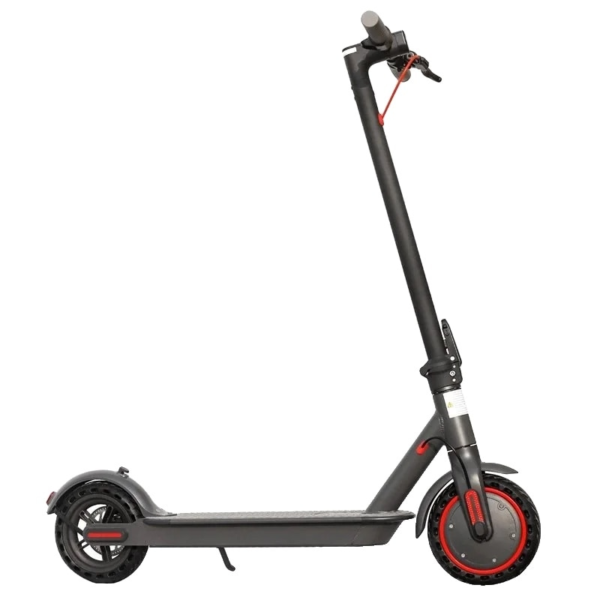
- Battery Range: 9–12 miles (15–20 km)
- Top Speed: 19.3 mph (31 km/h)
- Motor Power: 350 W
- Weight Capacity: 265 lb (120 kg)
- Charging Time: 5 hours
- Scooter Weight: 27.6 lb (12.5 kg)
PROS
- 8.5″ solid tires (puncture-resistant)
- IP65 rating
- App lock + speed settings
- Dual brakes (front electronic + rear disc)
- Compact folded size
CONS
- Short range (15–20 km)
- No suspension
- Kickstand not specified

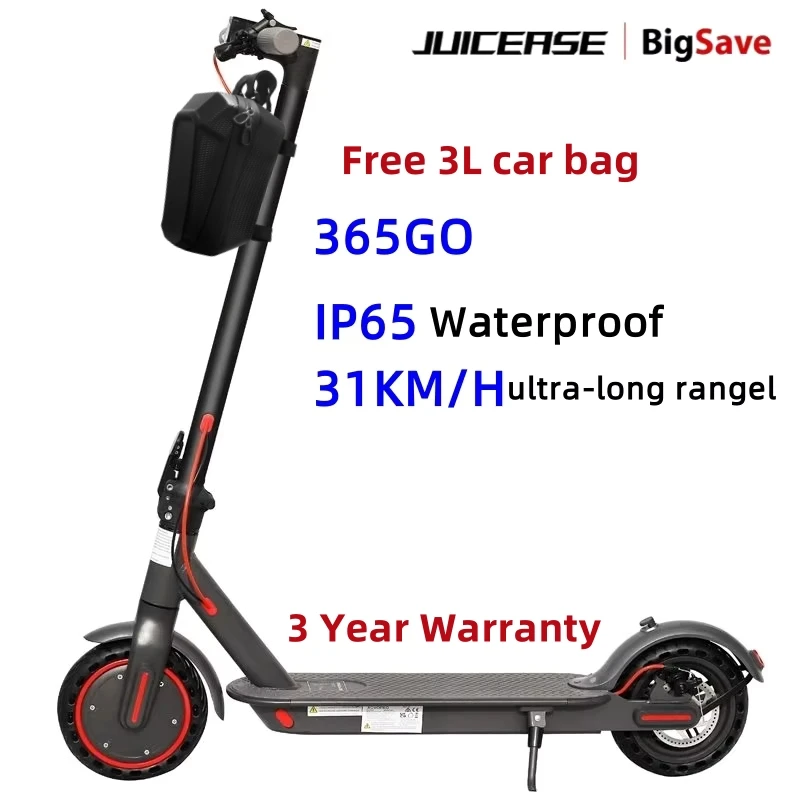
Table of contents
- What Is the JUICEASE 365Go?
- How the JUICEASE 365Go Works
- Key Specifications
- Design & Build Quality
- Performance Fundamentals
- Battery, Range & Efficiency
- Ride Quality & Comfort
- Braking & Safety Features
- Portability & Daily Usability
- Maintenance & Care
- Weather & Seasonal Considerations
- JUICEASE 365Go vs Alternatives
- Who the JUICEASE 365Go Is (and Isn’t) For
- FAQs
- Glossary
- Final Thoughts
The JUICEASE 365Go is a lightweight, entry-class electric scooter built around an efficient 36 V system and a 350 W hub motor. It targets daily city rides, school runs, and short commutes where portability matters as much as range. Because it balances weight, power, and ease of use, the JUICEASE 365Go suits first-time riders as well as multi-modal commuters who need a compact scooter that folds fast and stows neatly by a desk or under a train seat. If you’re comparing options in the same family, consider the JUICEASE ESMAX as a higher-capacity alternative, while the 365Go stays focused on portability and low-fuss ownership.
In this overview, you’ll get a clear, test-style look at its design, the official specifications, and how those specs translate into everyday riding. Moreover, you’ll find practical tips to maximize battery life, keep braking performance sharp, and ride safely in different seasons—without hype or guesswork.
What Is the JUICEASE 365Go?
At its core, the JUICEASE 365Go is a commuter-focused kick scooter with a brushless 350 W rear hub motor, a 36 V (7.8 Ah) battery, and 8.5-inch solid tires for low maintenance. Additionally, the scooter includes a simple bar-mounted display, a thumb throttle, and dual braking (rear mechanical disc plus front electronic brake/regenerative assist). The frame folds at the stem and uses an aluminum alloy chassis to keep overall weight low—roughly 26.5 lb (12 kg).
Consequently, it targets short to medium urban trips: getting to class, crossing a business campus, connecting the “last mile” from a bus stop, or making quick neighborhood errands. Because the folding mechanism is quick and the package is compact, the 365Go works well in tight apartments and shared office spaces where storage is limited.
How the JUICEASE 365Go Works
Motor. The 365Go uses a 350 W brushless hub motor mounted in the rear wheel. Brushless motors are efficient and quiet; think of them as sealed, low-maintenance power units. When you push the thumb throttle, the controller meters current to the motor in smooth pulses, so acceleration feels linear rather than jerky. As a result, starts are predictable for new riders.
Controller. The controller is the scooter’s brain. It decides how much power to send to the motor based on throttle input, speed mode, and battery state. Furthermore, it governs braking recovery for the electronic brake (regen), which lightly resists the wheel to reclaim a bit of energy on deceleration.
Battery. The 36 V, 7.8 Ah pack stores about 281 Wh of energy (36 V × 7.8 Ah ≈ 280.8 Wh). That’s enough for typical short commutes and campus loops with reserve for detours. Therefore, the pack is designed for day-to-day convenience rather than extreme range.
Throttle. A right-hand thumb lever controls speed. Small inputs result in smooth roll-on; large inputs call up full available torque for starts and short inclines. Because the motor is rear-mounted, launches feel planted, not nose-heavy.
Brakes. You get two systems working together: a rear mechanical disc brake for strong final stopping power and a front electronic/regen brake to scrub speed early with minimal lever effort. In practice, the combination helps you modulate deceleration: feather the lever for gentle slowdowns or pull deeper for firm bite.
Altogether, the 365Go rides like a straightforward commuter: predictable throttle, easy braking, and a simple cockpit that keeps your eyes on the path. Consequently, the learning curve is short even for first-time riders.
Key Specifications
Below are the official specifications organized into clean blocks for quick reference. U.S. units appear first, with metric in parentheses. Additionally, individual markets may vary minor details by batch.
General
| Item | Details |
|---|---|
| Model | JUICEASE 365Go |
| Intended use | Urban commuting and short trips |
| Frame material | Aluminum alloy |
| Tire size/type | 8.5 in solid, anti-skid |
| Display | Bar-mounted LCD |
| App | 365GO app (Bluetooth) |
| Water resistance | IP65-rated water resistance |
| Max rider weight | 265 lb (120 kg) |
| Weight (scooter) | 26.5 lb (12 kg) |
| Colors | Black (common market configuration) |
Performance & Power
| Item | Details |
|---|---|
| Motor | 350 W brushless rear hub |
| Top speed | Up to 15.5 mph (25 km/h) in standard mode; app-adjustable where permitted |
| Climbing | Manufacturer-claimed up to ~20°; real-world commuter hills (~7–10%) are the practical range |
| Drive | Rear-wheel drive |
Battery, Charging & Electrical
| Item | Details |
|---|---|
| Battery | 36 V, 7.8 Ah (≈ 280.8 Wh) |
| Claimed range | Up to ~15.5 mi (25 km), rider/terrain/temp dependent |
| Charger | 42 V class charger, DC barrel |
| Charge time | ~4–5 hours from low state |
| Energy recovery | Electronic regen on front circuit |
| Lighting | Front LED headlight, rear brake light; side reflectors |
Build & Dimensions
| Item | Details |
|---|---|
| Unfolded (L×W×H) | 42.1 × 16.9 × 43.3 in (1,070 × 430 × 1,100 mm) |
| Folded (L×W×H) | 42.1 × 16.9 × 20.9 in (1,070 × 430 × 530 mm) |
| Deck | Flat deck with grippy top surface |
| Folding | Stem-latch mechanism with rear hook catch |
Safety & Control
| Item | Details |
|---|---|
| Brakes | Rear mechanical disc + front electronic/regen |
| Speed modes | Multiple speed levels selectable on display/app |
| Kick-to-start | Yes (typical; prevents unintended launch) |
| Bell | Integrated bar-mounted bell |
| Traction | Solid tires with anti-skid tread (low-maintenance) |
Features & Extras
| Item | Details |
|---|---|
| Cruise Control | Available via app toggle (speed-hold after steady throttle) |
| App functions | Speed mode, lights, firmware updates, riding data |
| Kickstand | Side-mount |
| Portability | One-hand carry for short distances |
Warranty & Compliance
| Item | Details |
|---|---|
| Battery warranty | ~6 months (typical for this class) |
| Wear items | Tires/consumables generally excluded |
| Regional compliance | Check local regulations for speed and usage rules |
Note: Minor production differences may occur by region. Even so, the riding fundamentals remain consistent across batches.
Design & Build Quality
The JUICEASE 365Go favors simplicity over complexity. Its aluminum alloy frame keeps the weight low yet resists flex under normal commuting loads. Moreover, the stem diameter and cam-style folding latch feel familiar to anyone who has used an entry-level commuter scooter. Because the latch engages with a positive snap and a secondary hook, it resists accidental fold-down when locked correctly.
On the deck, the grippy surface holds your shoes in place over bumps. Meanwhile, the deck length is adequate for an average stance; riders with larger feet can stand diagonally for better fore-aft room. Cable routing is tidy and mostly internal, so snags are unlikely. The bar-mounted LCD is bright enough for daytime checks of speed and battery, and it stays readable at night without glare.
Fit-and-finish is what you expect from a commuter-grade scooter: even panel gaps, a clean paint finish, and consistent fastener quality. Furthermore, there’s minimal rattle at cruising speeds when the latch is adjusted properly. Because the tires are solid, you avoid the occasional hiss and mess of punctures; however, you’ll feel small vibrations on rough tarmac. The 365Go leans into that trade-off by keeping maintenance light and daily usability high.
Performance Fundamentals
Acceleration feel. With a 350 W hub, take-offs are confident but not abrupt. In the default speed mode, the scooter rolls forward smoothly, which helps new riders build confidence in crowded bike lanes. When you switch to a higher mode, throttle response quickens, yet remains controllable. Consequently, the first third of the lever travel provides fine control for creeping through pedestrians; the final third brings most of the motor’s push.
Cruising stability. Around 10–13 mph (16–21 km/h), the JUICEASE 365Go tracks straight and stable. Additionally, the deck height and wheelbase create a neutral, predictable feel. Because the rear wheel is driven, power application doesn’t lift the front wheel or introduce twitchiness. Small steering inputs guide it around potholes without wobble, assuming proper tire condition and a tight stem latch.
Hill behavior. For slopes in the 7–10% range, the 365Go maintains momentum with a running start. On longer climbs, expect speed to drop as the controller protects battery voltage. That’s normal for this power class. Therefore, if your route includes a short, steeper ramp (e.g., a garage exit), the scooter will clear it if you enter with some speed and use a higher mode.
Battery, Range & Efficiency
The 36 V, 7.8 Ah pack stores roughly 281 Wh—solid for short commutes and quick errands. In practice, real-world range depends on rider weight, headwinds, ambient temperature, and your route’s elevation changes. Consequently, planning with a small buffer is wise.
Rated vs real-world. The listed range—up to ~15.5 mi (25 km)—assumes moderate rider weight, smooth pavement, and conservative speed. Heavier riders, higher speeds, and cold weather will shorten it. Because solid tires reduce rolling friction from deformation, they can help range on smooth surfaces, though rough roads offset that with extra vibration losses.
Efficiency tips.
- Use Eco or mid modes when cruising flat streets; you’ll cut current draw and extend range.
- Smooth throttle inputs avoid sharp voltage dips that trigger early power limiting.
- Charge at room temperature whenever possible; lithium-ion chemistry accepts charge best in mild conditions.
- Store at ~50–70% if you won’t ride for a few weeks; this preserves long-term battery health.
Charging best practices. A typical 4–5-hour charge brings the pack to full. Plug the charger into the wall first, then the scooter, and place the charger on a hard, ventilated surface. After riding in rain, allow the scooter to dry before charging. Moreover, avoid running the pack to zero regularly; shallow cycles are easier on lithium cells.
Ride Quality & Comfort
Tires. The 8.5-inch solid tires eliminate flats, which is great for apartment dwellers and riders without workshop space. They also keep maintenance easy: no tubes to inspect, no sealant to clean. The trade-off is more vibration on coarse asphalt and a slightly sharper feel over cracks. On smooth pavement, the ride feels composed; on patchy streets, you’ll want to bend your knees to act as your own suspension.
Suspension. The JUICEASE 365Go relies on tire compliance and the rider’s stance. It doesn’t include shock absorbers, which keeps weight and cost down. You’ll still feel expansion joints and brick pavers, but the chassis stays rattle-free if the folding latch is tensioned correctly. Even so, softening your knees yields a more forgiving ride over broken surfaces.
Ergonomics. The bar width and stem height suit most riders in the 5’4″–6’1″ range (163–185 cm). Because the deck is low, stops are easy and stable. The thumb throttle reduces wrist fatigue compared to twist grips, and the brake lever has a clear engagement point. Consequently, long rides feel best at lower pressures on your legs—bend your knees and shift weight slightly rearward over bumps.
Stem flex. Mild stem flex is typical of lightweight commuters. On the 365Go, flex stays within a comfortable range if you keep the latch snug. At cruising speeds, you should not notice oscillation; above that, it remains manageable as long as you avoid white-knuckling the bars.
Braking & Safety Features
Brake system. The dual system pairs a mechanical rear disc with an electronic front brake that also regenerates a bit of energy. In practice, light lever pulls engage regen first, which feels like gentle engine braking on a small motorcycle. Pull deeper for the disc brake’s firm bite. This layering makes speed control intuitive in traffic. As a result, you can settle into steady commuting patterns quickly.
Modulation and feel. Half-lever pulls give a steady decel suitable for rolling stops; deeper pulls produce confident braking for tighter corners or hazards. Because the disc is at the rear, the scooter remains stable under heavy brake, with less risk of pitching. Nevertheless, always leave extra space on wet pavement.
Lights & reflectors. A bright forward LED helps you see and be seen at dusk. The rear light increases intensity when braking, and side reflectors add lateral visibility near intersections. Additionally, pairing the built-in lighting with reflective clothing further improves night visibility.
IP rating. With IP65-level water resistance, the JUICEASE 365Go handles light rain and wet streets. However, braking distances increase on wet pavement; start slowing earlier and avoid metal grates and painted lines, which become slick when wet.
Portability & Daily Usability
Folding. The stem latch flips open, the stem folds down, and a hook secures it to the rear fender area. The process takes only a few seconds once you’ve learned the motion. Importantly, the latch tension is adjustable—keep it tight enough to remove play but not so tight that it becomes hard to close.
Carrying. At 26.5 lb (12 kg), the 365Go is one-hand carryable up a flight of stairs, though two-hand carries remain more comfortable for longer distances. Meanwhile, the folded package is slim and lies flat in a car trunk or under a desk.
Storage. Store the scooter indoors when possible to keep electronics and bearings happiest. If you must leave it in a garage, avoid direct sun and freezing temperatures. Use a simple cable or U-lock to secure the frame to a fixed point when parking in public; never rely on the folding latch as a security point.
Day-to-day rituals. Riders often top up the battery at work or class. Because the pack charges in ~4–5 hours, a mid-day charge can ensure strong performance for the ride home and any errands. Consequently, range anxiety fades after you establish a routine.
Maintenance & Care
Even low-maintenance scooters benefit from a basic schedule. This simple plan keeps the JUICEASE 365Go feeling tight and predictable:
Before each ride (30–60 seconds):
- Check latch closure and stem play; re-tension if you feel movement.
- Test the brake lever for firm bite and normal travel.
- Tap the bell and flash the headlight to confirm power.
Weekly:
- Wipe the deck and bars; grit accelerates wear.
- Inspect tires for cuts or embedded debris.
- Confirm all visible fasteners (bar clamp, brake caliper mounts) are snug.
Monthly (or every ~150 miles / 240 km):
- Check rotor and pads for glazing. Lightly scuff pads if braking feels squealy or weak.
- Inspect charging port cap and cable for damage.
- Review app settings for firmware updates; apply only when you have time to test afterward.
Seasonally:
- Clean and re-lube folding latch pivot sparingly to prevent squeaks.
- Inspect wiring at the stem fold for chafing.
- Check deck grip tape; replace if it’s smooth or peeling.
Because the tires are solid, you won’t be patching tubes. That said, tire wear still matters—replace when the tread becomes shallow or the ride feels skittish on damp roads. Likewise, keep brake pads within service limits for consistent bite.
Weather & Seasonal Considerations
Rain. The IP65 rating helps, yet rain still changes traction and braking. Slow earlier, avoid sharp turns on paint or metal, and dry the scooter before charging. After wet rides, crack the deck open only if you suspect intrusion; otherwise, wipe dry and store indoors. As a result, electrical components remain protected.
Heat. High temperatures reduce lithium-ion longevity if the scooter bakes in a car. Park in the shade and allow the scooter to cool before charging on very hot days. Additionally, keep the charger on a ventilated surface.
Cold. Below ~50 °F (10 °C), expect noticeable range reduction. Batteries recover once warmed; charge indoors at room temperature for best results. Start rides gently so grease and seals warm without shock. Meanwhile, watch for black ice in shaded areas.
Wind. Headwinds raise power draw; plan range accordingly, especially on long, exposed bike paths. Conversely, tailwinds help efficiency and reduce heat buildup.
JUICEASE 365Go vs Alternatives
This section sets expectations by class rather than by specific competing brands.
Versus ultra-light commuters (sub-25 lb / 11.3 kg). The JUICEASE 365Go weighs slightly more but offers a more planted rear-drive feel, a higher load rating, and a more robust deck. If you carry the scooter up many flights daily, a super-light model may win. If you want better stability on mixed pavement, the 365Go’s balance pays off.
Versus mid-power commuters (500–700 W motors, larger batteries). Heavier, mid-power scooters accelerate faster and hold speed better on long climbs. However, they weigh more and cost more, and they can feel bulky on buses or inside small apartments. Therefore, if your route is flat to rolling and under 8–12 miles round-trip, the 365Go covers the need with lower mass and simpler upkeep.
Versus performance scooters (dual motors, big suspension). Those machines deliver thrilling acceleration and long range, but they’re heavy and overkill for bike lanes. By contrast, the 365Go is easier to store, simpler to service, and legal on more paths due to modest speeds.
Versus off-road/adventure scooters. Chunky tires and suspension shine on trails, yet they drag down efficiency in town. Consequently, the 365Go’s solid tires and compact chassis are tuned for pavement, not dirt tracks.
In short, the JUICEASE 365Go excels when you value portability, low fuss, and predictable commuting speeds over raw power. Ultimately, that combination suits dense urban routines.
Who the JUICEASE 365Go Is (and Isn’t) For
Great for:
- Students and new riders learning e-scooter control in bike lanes and campus paths.
- Multi-modal commuters who mix riding with train or bus segments and need fast folding.
- Apartment dwellers who prefer solid tires and minimal maintenance.
- Short-range city trips where 10–16 miles (16–25 km) of range covers the day.
Not ideal for:
- Steep, long hill routes where higher-wattage scooters maintain speed better.
- Riders seeking suspension comfort on broken pavement.
- Heavy cargo hauling beyond a backpack or small pannier.
Therefore, match your route and storage to your scooter class; the 365Go shines when weight and simplicity are top priorities.
FAQs
1) How fast is the JUICEASE 365Go?
In standard mode, it’s built for up to about 15.5 mph (25 km/h). Some app settings may adjust speed within local rules, but always follow your regional regulations. Additionally, choose safer modes on crowded paths.
2) What real-world range should I expect?
Plan for 9–15 mi (15–25 km) depending on rider weight, temperature, wind, and how fast you cruise. Using gentler modes and smooth throttle inputs extends range. Consequently, your routine matters as much as terrain.
3) Does it have cruise control?
Yes. When enabled in the app, the scooter can hold a steady speed after you keep the throttle constant for several seconds. Tap the brake or adjust the throttle to cancel. As always, use it only where it’s safe.
4) Can the JUICEASE 365Go climb hills?
It handles typical city inclines. Short ramps are fine with a running start, but long, steep grades will slow it down—this is normal for a 350 W commuter. Therefore, plan gear and speed accordingly.
5) Is the JUICEASE 365Go water-resistant?
It’s rated for water resistance consistent with IP65-style use, which covers light rain and wet streets. However, avoid deep puddles and always dry the scooter before charging.
6) What maintenance does it need?
Keep the folding latch snug, check the brake feel weekly, wipe grit off moving parts, and review fasteners monthly. Solid tires reduce puncture issues, but inspect tread for wear. Consequently, you’ll enjoy consistent braking and tracking.
7) Where can I find a concise JUICEASE 365Go overview?
Right here—you’ve got a complete JUICEASE 365Go overview including specs, practical tips, and care guidance without any sales fluff.
Glossary
- Ah (Amp-hour): Measures battery capacity. Higher Ah means more stored charge.
- Wh (Watt-hour): Battery energy (V × Ah). Closely tracks real range potential.
- Brushless motor: Efficient, low-maintenance electric motor used in modern e-scooters.
- Controller: Electronics that manage motor power, braking regen, and speed modes.
- Regen (regenerative braking): Uses the motor to slow the wheel and recover a bit of energy.
- Kick-to-start: Requires a short manual push before the motor engages, preventing accidental launch.
- IP rating: Ingress Protection; indicates resistance to dust and water.
- Stem flex: Small, normal deflection in the steering column under load.
- Speed mode: Pre-set limits for acceleration and top speed to match conditions or rules.
- Electronic brake: A motor-based braking effect that slows the wheel without mechanical pads.
- Mechanical disc brake: Caliper clamp on a rotor; delivers strong, predictable stopping power.
- Deck: The standing platform of the scooter.
- Hub motor: Motor built into the wheel hub; compact and quiet.
- Solid tire: Airless tire that avoids flats; firmer ride than pneumatic tires.
- Cruise Control: Electronic system that maintains a steady speed after a constant throttle period.
Final Thoughts
The JUICEASE 365Go earns its place as a compact, low-maintenance commuter. Its official specifications—350 W rear hub, 36 V/7.8 Ah battery, dual braking, IP-rated water resistance, and 8.5-inch solid tires—add up to a practical daily vehicle that’s easy to carry and easy to live with. If your rides are urban, relatively short, and storage space is tight, this scooter’s blend of portability and predictability fits the brief. Ultimately, that is why it continues to appeal to first-time riders and seasoned commuters alike.
Specifications
General
| Model The Model specifies the exact version or name of the scooter. It helps identify its unique design, features, and specifications within the manufacturer’s product line. Knowing the model makes it easier to compare options, find compatible accessories, or look up support information. | 365Go |
| Brand The Brand identifies the manufacturer or company that designs and produces the scooter. A trusted brand is a sign of quality, reliability, and good customer support. Well-known brands often have higher standards for safety, performance, and after-sales service, giving you more confidence in your purchase. | JUICEASE |
| Release Date The Release Date indicates when the scooter model was officially launched on the market. This helps you know how current the design, technology, and features are. A newer release date often means updated components, improved performance, and the latest safety or smart features. | 17 November 2025 |
| Recommended Age Recommended Age indicates the minimum age range that the scooter is designed for, based on safety, size, and ease of use. Following the recommended age helps ensure that riders can handle the scooter’s speed, weight, and controls comfortably and safely. Always check local laws and use protective gear, especially for younger riders. | 14+ |
Performance & Power
| Motor Power (Wattage) What it means: The motor power, measured in watts (W), shows how strong the scooter’s electric motor is. Why it matters: Higher wattage usually means better acceleration, more torque, and improved performance on hills or rough terrain. For example, a 250W motor is good for flat city roads and light riders, while a 500W or 1000W motor provides more power for faster speeds or climbing steep inclines. | 350 W brushless hub motor |
| Top Speed The Top Speed indicates the maximum speed that the scooter can reach under optimal conditions. It’s usually measured on level ground with a fully charged battery and an average rider weight. A higher top speed allows you to travel longer distances faster, but always ensure you ride within legal speed limits and your personal comfort zone for safety. | 19.3 mph (31 km/h); region default 15.5 mph (25 km/h) |
| Battery Capacity Battery Capacity refers to the total amount of energy the scooter’s battery can store, usually measured in ampere-hours (Ah) or watt-hours (Wh). A higher battery capacity means you can ride longer distances on a single charge, reducing the need for frequent recharging. Keep in mind that actual range can vary depending on rider weight, terrain, speed, and weather conditions. | 36 V 7.8 Ah |
| Estimated Range per Charge The Estimated Range per Charge indicates the average distance the scooter can travel on a single full battery charge. This range is calculated under optimal conditions, such as flat terrain, moderate speed, and average rider weight. Real-world range may vary depending on riding style, terrain, weather, and load. A longer range means fewer recharges and greater freedom for longer trips. | 9–12 miles (15–20 km) |
| Hill Climb Ability Hill Climb Ability describes the maximum incline or slope that the scooter can handle while maintaining stable performance. It’s typically expressed as a percentage or in degrees. A higher hill climb rating means the scooter can tackle steeper hills without losing too much speed or power. Actual climbing performance may vary based on rider weight, battery charge, and terrain conditions. | Up to 20° |
| Drive System The Drive System refers to how power from the motor is delivered to the wheels. Electric scooters typically use either a hub motor (directly integrated into the wheel) or a chain/belt drive system. A high-quality drive system ensures smooth acceleration, efficient power transfer, and low maintenance. The choice of drive system affects performance, noise level, and overall ride experience. | Not specified |
Charging & Electrical
| Charging Time Charging Time indicates how long it takes to fully recharge the scooter’s battery from empty to 100% using the standard charger provided. Faster charging means less downtime and more time on the road. Actual charging time may vary slightly depending on battery capacity, charger output, and environmental conditions. | Approx. 5 hours |
| Battery Type Battery Type refers to the specific technology used in the scooter’s battery, which affects performance, lifespan, weight, and charging time. Most modern electric scooters use high-quality lithium-ion (Li-ion) batteries because they offer a good balance of energy density, durability, and low maintenance. A reliable battery type ensures consistent power delivery and longer riding ranges. | Lithium-ion battery pack |
| Removable Battery A Removable Battery means the battery pack can be easily detached from the scooter for convenient charging and replacement. This feature allows you to charge the battery separately, swap it with a spare for extended range, or securely store it indoors in extreme weather. Removable batteries add flexibility and make it easier to keep your scooter powered up wherever you are. | Non-removable internal battery (fixed pack) |
| Regenerative Braking Regenerative Braking is an energy-saving feature that converts some of the energy normally lost during braking back into battery power. When you slow down or brake, the motor works in reverse to generate electricity, which helps extend the scooter’s range and improves overall efficiency. This system also reduces wear on traditional brake components, leading to lower maintenance over time. | Not specified |
| Lighting Lighting refers to the built-in front and rear lights that enhance visibility and safety when riding in low-light conditions or at night. Good lighting helps you see the road ahead and ensures that other road users can see you. Many scooters include LED headlights, taillights, and sometimes brake lights or side reflectors for added safety and compliance with local traffic regulations. | LED headlight & rear light |
Build & Dimensions
| Scooter Weight Scooter Weight refers to the total weight of the scooter when fully assembled, including the battery. This affects how easy it is to carry, lift, and store the scooter when not in use. A lighter scooter is more portable and convenient for commuting, especially if you need to carry it upstairs or onto public transport. Keep in mind that a sturdy frame and quality components may add to the weight but also contribute to better durability and ride stability. | 27.6 lb (12.5 kg) |
| Maximum Rider Weight Maximum Rider Weight indicates the highest rider weight that the scooter is designed to safely support while maintaining optimal performance and stability. Staying within this limit helps ensure reliable acceleration, braking, and climbing ability, and it protects the frame, suspension, and motor from excessive strain. Exceeding the recommended limit may reduce performance and increase wear on components. | 265 lb (120 kg) |
| Deck Size Deck Size refers to the dimensions of the scooter’s standing platform. A wider and longer deck provides more foot space, allowing you to stand comfortably and adjust your stance while riding. A well-sized deck improves balance and stability, especially on longer rides or at higher speeds. Compact decks, on the other hand, help keep the scooter lightweight and portable. | Aluminum alloy frame; foldable stem |
| Handlebar Height Handlebar Height refers to the distance from the deck to the handlebars, which affects your riding posture and comfort. An appropriate handlebar height helps you maintain good balance, reduces strain on your back and arms, and makes steering more comfortable. Some scooters have adjustable handlebars to fit riders of different heights, while others have a fixed height for a streamlined design. | Fixed (not specified) |
| Folding Mechanism The Folding Mechanism describes how easily and securely the scooter can be folded for carrying and storage. A well-designed folding system lets you quickly collapse the scooter into a compact size, making it convenient to transport on public transit, store under a desk, or fit into a car trunk. Look for sturdy latches and safety locks to ensure the scooter stays firmly in place when folded or unfolded. | 3-step quick fold (~3 s) |
| Dimensions Folded Dimensions indicate the size of the scooter when it’s fully folded. This measurement shows how much space the scooter will take up when stored or carried, making it easier to check if it will fit in your car trunk, under a desk, or in a closet. Compact folded dimensions are ideal for commuters who need to bring their scooter on public transport or store it in tight spaces. | Folded: 1070 × 430 × 540 mm; Unfolded: 1070 × 1120 × 430 mm |
| Material Material refers to the primary construction materials used for the scooter’s frame and key components. High-quality materials like aircraft-grade aluminum, reinforced steel, or durable composites provide strength, stability, and a lighter overall weight. A sturdy material ensures the scooter can handle daily wear and tear while maintaining safety and performance. | Aluminum alloy |
Safety & Control
| Brake Type(s) Brake Type(s) describe the braking systems the scooter uses to help you slow down or stop safely. Common brake types include mechanical brakes (like drum or disc brakes), electronic brakes, and foot brakes. Many scooters combine multiple braking systems for added safety and shorter stopping distances. The type and quality of brakes affect your control, especially when riding at higher speeds or on slopes. | Front electronic + rear disc |
| Suspension Suspension refers to the system that absorbs shocks and vibrations while riding, providing a smoother and more comfortable ride over uneven or rough surfaces. Scooters may have front suspension, rear suspension, or dual suspension for better shock absorption and stability. Good suspension helps reduce rider fatigue and improves control, especially when riding on bumpy roads or off-road paths. | None |
| Tire Type Tire Type refers to the kind of tires the scooter uses, which directly affects ride comfort, traction, and maintenance. Common types include solid (airless) tires, pneumatic (air-filled) tires, or hybrid options. Pneumatic tires offer better shock absorption and a smoother ride on rough surfaces, while solid tires are puncture-proof and require less upkeep. The right tire type helps ensure safe handling and a comfortable ride in different conditions. | 8.5″ solid (non-slip) |
| Tire Size Tire Size indicates the diameter and width of the scooter’s tires, which affect ride comfort, stability, and how well the scooter handles different terrains. Larger tires generally offer better shock absorption and a smoother ride over bumps and rough surfaces, while smaller tires keep the scooter lighter and more portable. Choosing the right tire size helps ensure a balance between agility and comfort. | 8.5-inch |
| Kickstand The Kickstand is a built-in stand that allows you to park your scooter upright when it’s not in use. A sturdy kickstand keeps the scooter stable and prevents it from tipping over, protecting it from scratches and damage. It also makes storing and accessing your scooter more convenient, whether you’re at home, work, or on the go. | Not specified |
| Water Resistance Rating Water Resistance Rating indicates how well the scooter is protected against water and moisture, usually shown as an IP (Ingress Protection) rating. This rating helps you understand whether the scooter can handle light rain, splashes, or wet roads without damage. While most scooters are not fully waterproof, a good water resistance rating adds peace of mind when riding in changing weather conditions. Always avoid deep puddles or submerging the scooter to protect its electrical components. | IP65 |
Features & Extras
| Display/Console The Display (or Console) shows important real-time information about your ride, helping you monitor your scooter’s status at a glance. Typical displays show speed, battery level, distance traveled, and riding mode. Some models also include additional features like Bluetooth connectivity, app integration, or backlighting for better visibility at night. A clear and easy-to-read display enhances safety and convenience on every trip. | Phone app acts as dashboard (speed/battery/mileage) |
| Ride Modes Ride Modes refer to the different speed and power settings you can choose to match your riding style or road conditions. Common modes include eco for maximum range and energy efficiency, standard for everyday balance, and sport or turbo for higher speed and stronger acceleration. Switching between ride modes allows you to customize performance, conserve battery, and ride safely in various environments. | 3 speed levels (15/20/25 km/h) |
| Smart App Connectivity Smart App Connectivity lets you pair your scooter with a dedicated mobile app via Bluetooth. Using the app, you can monitor real-time ride stats like speed, battery level, and range, adjust settings such as ride modes or cruise control, lock the scooter for added security, and sometimes receive firmware updates. This feature adds convenience and allows you to personalize your riding experience right from your smartphone. | 365GO app: lock, speed limit, zero/non-zero start, auto-off, firmware updates |
| Anti-Theft System The Anti-Theft System helps protect your scooter from unauthorized use or theft. This feature can include built-in alarms, electronic motor locks, GPS tracking, or remote locking through a mobile app. A good anti-theft system provides peace of mind when parking your scooter in public spaces, adding an extra layer of security to safeguard your investment. | App lock |
| Cruise Control Cruise Control allows you to maintain a steady speed without continuously holding the throttle. This feature makes longer rides more comfortable by reducing hand fatigue and providing a smoother, more relaxed riding experience — especially on flat, open roads or bike lanes. For safety, cruise control can usually be easily activated or deactivated while riding. | Yes (cruise control) |
| Accessories Included Accessories Included lists the additional items that come with the scooter to enhance your riding experience and convenience. Common accessories may include a charger, kickstand, bell, lights, phone holder, or carrying strap. These extras add value by making your scooter safer, easier to use, and ready to ride straight out of the box. | Scooter, charger (42V/2A), tools, manual |
Warranty & Compliance
| Warranty Period The Warranty Period indicates how long the manufacturer guarantees the scooter against defects in materials and workmanship under normal use. A good warranty provides peace of mind, showing the brand’s confidence in its product quality. Always check what parts are covered, such as the frame, battery, and motor, and follow the maintenance guidelines to keep your warranty valid. | Region-dependent |
| Certifications Certifications confirm that the scooter meets specific safety, quality, and environmental standards set by recognized organizations or regulatory bodies. Common certifications may include CE, RoHS, UL, or other local compliance marks, depending on your region. These certifications ensure that the scooter is manufactured to high standards and is safe and legal to use in your country. | Not specified |
Price Comparison




